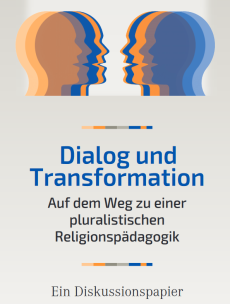“Towards a pluralistic religious pedagogy”
Jewish, Christian and Islamic theologians and experts in religious pedagogy call for a new way of thinking in religious education – “Embed religious diversity in schools theologically – No exclusivist attitudes”
Press release of February 19, 2020

Given religious diversity in schools, Jewish, Christian and Islamic theologians and experts in religious pedagogy are calling for a religious education that is based on a pluralistic religious pedagogy. “Every religious community wants and should be able to pass on its faith to the next generation. But we can and should no longer teach the view today that it is only one particular religion that possesses the truth and that is therefore superior to all others”. That is the argument made by the religious scholar and Protestant theologian Perry Schmidt-Leukel, and the expert in Islamic religious pedagogy Mouhanad Khorchide, both from the University of Münster’s Cluster of Excellence “Religion and Politics”. Part of the educational mission of schools is to enable young people to deal with the plurality of worldview in a respectful and constructive manner. “Experience shows how exclusivist attitudes turn religions into instruments of power and divide societies”. Together with 14 German theologians drawn mainly from the discipline of religious pedagogy, Schmidt-Leukel and Khorchide have produced a discussion paper, “Dialogue and Transformation”, which they will present for the first time in public at a study day in Bonn on 19 March.
The paper argues that a religious education that takes into account growing religious diversity must promote interreligious learning and dialogue between religious communities, something that a religious community can only meaningfully do “together with other religious communities in the school system”. The authors focus on the theological and pedagogical background of religious education, and argue that the theological foundations for this are present in Judaism, Christianity and Islam. These religions can avoid making their own views absolute, and can see themselves instead as part of “an interreligious learning community”. The discussion paper does not outline a specific model for organizing religious education. “We want”, say Schmidt-Leukel and Khorchide, “to stimulate discussions about possible options at school and about how to organize dialogue-oriented interreligious education”.
Different organizational models
Religious education at state schools in Germany is regulated by the Basic Law as a cooperation between the state and religious communities: the state is the organizer of the school, while the religious communities are responsible for what is actually taught in religious education (this is therefore usually along denominational lines). Several federal states have now introduced models in which the two large Christian churches organize religious education together, and Hamburg has introduced the model of “religious education for all”.
“Besides that”, says Schmidt-Leukel, “models in which religions cooperate can also be discussed, including, as in Hamburg, a religious education for which different religious communities share responsibility. It is in any case high time to discuss “how we deal in the classroom with the truth claims of other religions, and which attitude we adopt in the face of growing diversity”. Pupils should be able to experience in religious education the wealth of insights into life that different religions provide.
The discussion paper is entitled “Dialogue and Transformation. Towards a pluralistic religious pedagogy”, and is available online, along with the programme for the study day in Bonn on 19 March. The working group met on the initiative of the “Bonn Protestant Institute for Vocational Religious Studies” (bibor) of the University of Bonn, and the “Pedagogical Theological Institute of the Protestant Church in the Rhineland” (PTI). The discussion paper is intended to outline the foundations for a pluralistic religious pedagogy, and argues that the theological focus of religious pluralism can overcome “a view of differences that stresses separation”, and can instead help “develop a community in which differences do not cause separation”. (vvm)

